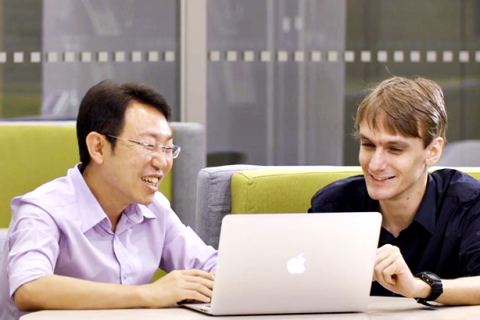By Rebecca Tan
SMU Office of Research & Tech Transfer – Before she traded in her judge’s robes for an academic gown, Assistant Professor Dorcas Quek Anderson worked in the judiciary, first at the Supreme Court and subsequently at the State Courts, where more than 95 percent of Singapore’s cases are heard. In the seven years that she was a district judge at the State Courts, she witnessed the kinds of problems that led people to lawsuits, and came away with an expanded understanding of what justice means.
“I realised that what is critical within the concept of justice is not merely what the judge decides, but also how proceedings are conducted,” says Professor Quek, who is currently a faculty member at the Singapore Management University (SMU) School of Law. “I am very interested in examining how individuals experience justice, a concept known in recent legal-psychological research as procedural justice.”
Unlike substantive justice, which refers to the outcome of the trial, procedural justice focuses on the process of reaching that outcome. Even if a court rules in your favour, for example, you may not feel like you have been treated with respect or that the person in authority was even-handed. These psychological factors contribute to your perception of whether justice was served, Professor Quek explains.
Seeking justice via mediation
The distinction between substantive and procedural justice is an important one in the realm of mediation, which is sometimes perceived to give the disputing parties procedural justice without substantive justice. “Because the disputing parties in mediation get to decide on an outcome that fits their circumstances, it is commonly assumed that mediation has nothing to do with the law,” Professor Quek says.
“I argue that there is an invaluable link between substantive and procedural justice, and that mediation can be successfully used to achieve both.”
Mediation, Professor Quek continues, plays a vital role in increasing access to justice because it is much more affordable than going to court. However, the standards and ethical guidelines governing mediation need to be strengthened to ensure that substantive justice is still achieved, she said.
“This is both the attraction and challenge of mediation: the flexibility of the process means that there are no detailed rules governing the process. Instead, there are principles encapsulated in most mediation codes of ethics, but it is often difficult to apply these broad guidelines in real situations,” Professor Quek said.
Keeping norms in mind
For example, one of the most cherished principles in mediation is the idea of party self-determination, which has been commonly understood to mean that the mediator should not give any advice on the legal principles relevant to the conflict. However, mediation can sometimes lead to unjust outcomes if the parties involved agree to a resolution that breaches well-established legal or societal norms, particularly if they are unaware of what those norms are.
“If people are not aware of certain critical norms, then the mediator’s role may also involve educating them on the relevant norms rather than being hands-off about it,” Professor Quek says. Including norm education as an ethical principle would go a long way towards ensuring that substantive justice is served, she adds. Professor Quek has presented this argument at the Australian Dispute Resolution Research Network and the Law and Society Association Conference (New Zealand and Australia), and is preparing a more detailed article for publication in an academic journal.
The constraints on access to justice
Professor Quek has also examined the constraints imposed on a person’s access to justice in the courts, particularly when there are related lawsuits or an earlier opportunity to have commenced legal proceedings. “The courts have to balance a person’s access to justice against many other interests, such as the need for finality in litigation and not wasting public resources,” Professor Quek says. “There is always a tension between the individual and these other interests. The question is deciding in whose favour the balance should tilt.”
In a comment recently published in Civil Justice Quarterly, Professor Quek examined a Singapore decision where a person was prevented from bringing his case to court because he did not take part in an earlier suit on the same matter, and then made a claim that contradicted the earlier decision. In this case, upholding the finality of the previous judgment took precedence over the person’s access to justice because the person’s conduct was deemed to be an abuse of the court’s process.
The impact of technological developments on access to justice
Apart from the increasing popularity of mediation, one other development that is likely to have a profound impact on access to justice is the impetus to move dispute resolution online. Already being rolled out in the United Kingdom, the Online Solutions Courts aim to reduce the case load of physical courts and give people more avenues to settle their disputes.
“Technology could help people diagnose their problems and give them more information about where to go to resolve their problems. The courts are increasingly using it as a tool to triage disputes and direct them to the most appropriate dispute resolution process,” Professor Quek says. “These technological developments are also changing the way justice is experienced and indeed the whole process of justice itself.”
To discuss the impact of technology and other rapidly changing aspects of dispute resolution, Professor Quek and her School of Law colleague Assistant Professor Eunice Chua have co-convened a research forum titled ‘Expanding the Scope of Dispute Resolution and Access to Justice: The Use of Mediation within the Courts’, which was held on 12-13 March 20181. At the forum, Professor Quek presented a paper on how the convergence of alternative dispute resolution and online dispute resolution is changing the nature of access to justice.
“Because of my background, I have always felt that much of what we learn in research can be implemented to benefit the lay person,” Professor Quek says. “We hope that bringing together lawyers, academics and members of the judiciary – such as our guest of honour Justice Belinda Ang – will help the research be heard by those who are involved in everyday legal work.”
“At the same time, we hope to create space for meaningful conversations so that the academics can also learn from those who face legal issues in their daily lives, and we can all benefit from each other’s perspectives.”
1Read our post-event coverage "From zero-sum to win-win" on the research forum 'Expanding the Scope of Dispute Resolution and Access to Justice: The Use of Mediation within the Courts’ here.
Back to Research@SMU Issue 53
See More News
Want to see more of SMU Research?
Sign up for Research@SMU e-newslettter to know more about our research and research-related events!
If you would like to remove yourself from all our mailing list, please visit https://eservices.smu.edu.sg/internet/DNC/Default.aspx

